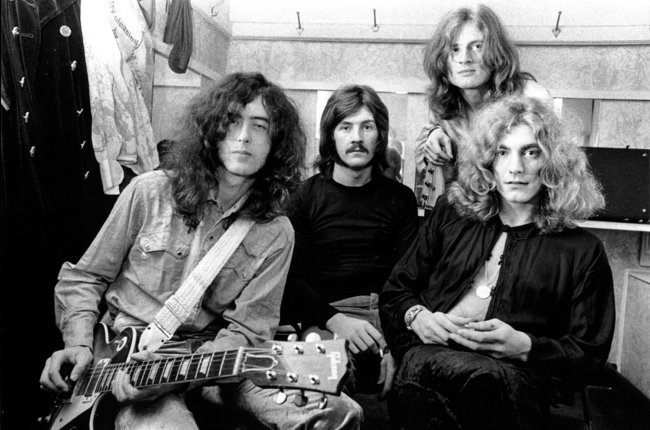The "Stairway to Heaven" legal fight has become an even more formidable climb for the 9th Circuit, as Led Zeppelin's legal team has filed a cross-appeal asking it to consider whose glittering gold should be used to pay for the litigation.
Last summer, a jury found guitarist Jimmy Page did not copy the song's iconic riff from a 1968 instrumental piece by Spirit called "Taurus."
Michael Skidmore, the trustee who sued the band on behalf of late Spirit songwriter Randy Wolfe's estate, wasn't content to accept the loss. His attorney Francis Malofiy filed a 90-page appeal brief in March, arguing that the jury did not believe the songs were substantially similar because it wasn't allowed to hear the "Taurus" sound recording.
At the time Wolfe created the composition, sheet music was protected by federal copyright law but sound recordings weren't.
The jury did find, however, that Page had access to the song — and that's the cornerstone of Malofiy's second major argument on appeal. He says the jury wasn't adequately informed about the inverse ratio rule, which essentially lowers the bar for substantial similarity when a high degree of access has been proven.
Led Zeppelin attorney Peter Anderson filed an even more voluminous reply on Friday, arguing that "substantial evidence supports the jury's verdict and Skidmore's appeal has absolutely no merit."
Specifically, Anderson says the argument about jury instructions regarding the inverse ratio rule is moot because Skidmore "did not prove the high degree of access required to trigger that rule" and "no amount of access will establish copyright infringement if, as the jury found here, there is no substantial similarity in protectable expression."
As to the sound recording issue, Anderson argues, "Skidmore misreads statutes and cases to advocate against black-letter copyright law that the copyright registered in a work protects only the copyrighted work and that federal copyright does not extend to sound recordings created prior to February 15, 1972."
In addition to replying to Skidmore's appellate arguments, Anderson is cross-appealing. He's asking the 9th Circuit to affirm the judgment, but reverse U.S. District Court judge R. Gary Klausner's order regarding fees. Anderson also represents publisher Warner/Chappell Music, which bore nearly all of the legal costs and fees for the defense — and he wants the appellate court to make Wolfe's estate pick up the tab.
Klausner in August denied Warner/Chappell's request for an award of $800,000 in fees and costs, finding that Skidmore's lawsuit was not frivolous or objectively unreasonable — despite litigation misconduct by his attorney.
Anderson says Klausner erred in treating that misconduct with equal weight as the Fogerty factors, a set of standards that were established for evaluating fee awards in copyright cases in a 1994 U.S. Supreme Court case involving singer John Fogerty.
"The District Court — without considering whether its ruling furthered the purposes of the Copyright Act — identified the following Fogerty factors: '(1) "the degree of success obtained on the claim"; (2) "frivolousness"; (3) "motivation"; (4) "objective reasonableness of factual and legal arguments"; and (5) "need for compensation and deterrence,"'" writes Anderson. "However, the District Court erred on the law and the record, and all of the Fogerty factors favor awarding attorneys’ fees."
Anderson argues that it was unreasonable for Skidmore to sue based on "the shared presence of five pitches of the chromatic scale" when it's fundamentally true that "no one owns musical scales."
Further, Anderson argues that "motivation" should have been a strike against Skidmore because Wolfe in his lifetime did not sue Led Zeppelin, and neither did any of his heirs until a 2014 Supreme Court case eliminated the defense of laches in copyright claims. That case, Petrella v. Metro-Goldwyn-Mayer, opened the floodgates for damages claims that were previously time-barred as long as they were filed within the three-year statute of limitations. Here, Led Zeppelin became a target by releasing a remastered version of the band's album IV containing "Stairway" in 2014.
Finally, Anderson argues that treating litigation misconduct as an unofficial sixth Fogerty factor dilutes the severity of the act.
"Defendants respectfully submit that the District Court’s Judgment and Amended Judgment should be affirmed and that the District Court’s Order denying Warner/Chappell’s motions for attorneys’ fees and additional costs should be reversed with instructions to grant those motions," writes Anderson. "In addition, and including because Skidmore continues to advance frivolous arguments and misstate the law ... defendants should recover their costs and attorneys’ fees on appeal."
Read the full answering and opening brief here.
This article originally appeared in THR.com.








